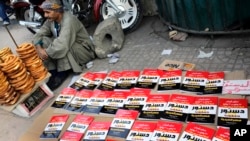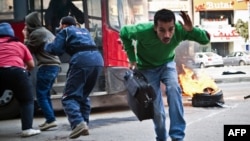In recent weeks, Egypt’s military-backed government has introduced new measures to crack down on the Muslim Brotherhood. It has labeled the group a terrorist organization, and has also detained Al Jazeerah journalists said to be backing them. Civil libertarians have criticized the moves. But others say they’re necessary as the country heads toward a constitutional referendum and elections.
Despite the measures, protests continue in some towns and universities.
One Egyptian analyst says the crackdown is working -- and that protests to reinstate ousted Islamist president Mohammed Morsi have become smaller and less frequent.
Gamal Soltan, an associate professor of political science at American University in Cairo, questions the designation of protesters as students or journalists.
“ [When we mention] students or journalists,” he asserted, “we are talking about non-ideological groups. But [these] students, they are actually Muslim Brothers, and unfortunately, Al Jazeerah has been an integral part of the conflict in Egypt. It has taken sides. The situation has changed, and it is now on the wrong side.”
He says reconciliation with the Muslim Brotherhood is out of the question for the time being. He says the government’s policy is to redefine political Islam – by excluding the Brotherhood but allowing Islamic moderates such as the Al-Nour party to be on the ballot for parliament.
Soltan says people want stability.
“The majority of the people,” he said, “tend to support the new constitution and want to restore normalcy. Most are hungry for a kind of a strongman, a strong government to be able to bring order and peace and to put the economy back on track.”
Constitutional referendum
Said Sadek, an affiliate professor of political sociology at American University, says the Muslim Brotherhood is using protests and riots to derail the referendum.
“If there is a high turnout like 25 million out of 50 million,” he says, “this would be the official death certificate for the Muslim Brotherhood and the Morsi regime. The Muslim Brotherhood has been in existence since 1928; its failure would affect other movements in the Islamic world.”
Temporary measures
Sadek says the government’s increased powers to detain and arrest are temporary, and may well change when, in his view, the Brotherhood is defeated.
“We are in exceptional circumstances,” he says, “and you must take lots of measures. Our neighboring countries are failing states and now there’s an internal organization that wants to destroy our army and police to exert whatever [power] they like through their secret militias...there are no human rights for those who don’t believe in human rights.”
Political maneuvering
Recently, Egypt’s interim president, Adly Mansour, suggested that the presidential elections come before those for the legislature. Soltan says it’s a good idea, because parliamentary campaigns can be divisive, and the pressure of electoral competition could fragment the broad coalition of parties that support the military-led roadmap to democracy. He sees an elected president lending stability in the lead-up to the parliamentary polls.
Others are more critical of the military-led transition.
Na’eem Jeenah, the executive director of the Afro-Middle East Center in Johannesburg, sees political manipulation behind the choice of election dates.
“You [could] have the election of a strong president who would be able to dictate the time table and the rules for how the parliamentary elections take place,” he said. “[Head of the armed forces, General Adbul Fattal] al Sisi [may] stand for president, and he [would] be the kind of strongman president which the continent has been suffering under for decades.”
Jeenah says the current crackdown does not just affect the Islamists but anyone who disagrees with the military-led ouster of former President Morsi. He says the stand-off is not between Islamists and secularists, but between those for and against the military-led intervention.
He says among those imprisoned by what he calls draconian anti-terror laws are secular activists and journalists. He says the laws are meant to silence critics prior to the referendum on the new constitution.
Media bias
Analyst Mohamad Hamas Elmasry says polling data continue to show that Egyptian society is largely split, with a one-sided media environment that promotes the interim government, not reconciliation.
Elmasry is an assistant professor and the graduate director in the Department of Journalism and Mass Communication at the American University in Cairo.
He says both the media and government routinely suggest the Brotherhood is treasonous and un-Egyptian, and have praised massacres of Brotherhood protesters.
As an example, he referred to the killings of hundreds of protestors at Rabba al-Adawiya camp outside Cairo by security forces. The government said troops fired in self defense.
“After the massacres in August,” says Elmasry, “the Egyptian media were praising the government-instigated violence. One of the private networks on TV was showing footage of the dispersal of the largest protests, while playing [the triumphant soundtrack to the film] Rocky in the background. “
Paper promises
Elmasry doubts that the proposed new constitution will restore civil liberties, despite articles that promise freedoms. He says the constitution under former president Hosni Mubarak, who ruled for over 30 years, also guaranteed press and personal freedoms. However, those promises were replaced by what he calls draconian laws which remain on the books today.
“Another problem with the [proposed] constitution,” he says, “is that the minister of defense is going to be essentially the most powerful person in the country. His appointment must be approved by the military [over the next two presidential terms], the president can not remove him, and his term is eight years long, which is twice as long as the president's term.”
Elmasry says democracy cannot develop in an environment of systematic exclusion, a repressive legal framework, and military domination.
Others say what Egypt needs is stability and evolution, not revolution. They say a government headed by a military-backed president and a multi-party parliament is a step in the right direction.
Despite the measures, protests continue in some towns and universities.
One Egyptian analyst says the crackdown is working -- and that protests to reinstate ousted Islamist president Mohammed Morsi have become smaller and less frequent.
Gamal Soltan, an associate professor of political science at American University in Cairo, questions the designation of protesters as students or journalists.
“ [When we mention] students or journalists,” he asserted, “we are talking about non-ideological groups. But [these] students, they are actually Muslim Brothers, and unfortunately, Al Jazeerah has been an integral part of the conflict in Egypt. It has taken sides. The situation has changed, and it is now on the wrong side.”
He says reconciliation with the Muslim Brotherhood is out of the question for the time being. He says the government’s policy is to redefine political Islam – by excluding the Brotherhood but allowing Islamic moderates such as the Al-Nour party to be on the ballot for parliament.
Soltan says people want stability.
“The majority of the people,” he said, “tend to support the new constitution and want to restore normalcy. Most are hungry for a kind of a strongman, a strong government to be able to bring order and peace and to put the economy back on track.”
Constitutional referendum
Said Sadek, an affiliate professor of political sociology at American University, says the Muslim Brotherhood is using protests and riots to derail the referendum.
“If there is a high turnout like 25 million out of 50 million,” he says, “this would be the official death certificate for the Muslim Brotherhood and the Morsi regime. The Muslim Brotherhood has been in existence since 1928; its failure would affect other movements in the Islamic world.”
Temporary measures
Sadek says the government’s increased powers to detain and arrest are temporary, and may well change when, in his view, the Brotherhood is defeated.
“We are in exceptional circumstances,” he says, “and you must take lots of measures. Our neighboring countries are failing states and now there’s an internal organization that wants to destroy our army and police to exert whatever [power] they like through their secret militias...there are no human rights for those who don’t believe in human rights.”
Political maneuvering
Recently, Egypt’s interim president, Adly Mansour, suggested that the presidential elections come before those for the legislature. Soltan says it’s a good idea, because parliamentary campaigns can be divisive, and the pressure of electoral competition could fragment the broad coalition of parties that support the military-led roadmap to democracy. He sees an elected president lending stability in the lead-up to the parliamentary polls.
Others are more critical of the military-led transition.
Na’eem Jeenah, the executive director of the Afro-Middle East Center in Johannesburg, sees political manipulation behind the choice of election dates.
“You [could] have the election of a strong president who would be able to dictate the time table and the rules for how the parliamentary elections take place,” he said. “[Head of the armed forces, General Adbul Fattal] al Sisi [may] stand for president, and he [would] be the kind of strongman president which the continent has been suffering under for decades.”
Jeenah says the current crackdown does not just affect the Islamists but anyone who disagrees with the military-led ouster of former President Morsi. He says the stand-off is not between Islamists and secularists, but between those for and against the military-led intervention.
He says among those imprisoned by what he calls draconian anti-terror laws are secular activists and journalists. He says the laws are meant to silence critics prior to the referendum on the new constitution.
Media bias
Analyst Mohamad Hamas Elmasry says polling data continue to show that Egyptian society is largely split, with a one-sided media environment that promotes the interim government, not reconciliation.
Elmasry is an assistant professor and the graduate director in the Department of Journalism and Mass Communication at the American University in Cairo.
He says both the media and government routinely suggest the Brotherhood is treasonous and un-Egyptian, and have praised massacres of Brotherhood protesters.
As an example, he referred to the killings of hundreds of protestors at Rabba al-Adawiya camp outside Cairo by security forces. The government said troops fired in self defense.
“After the massacres in August,” says Elmasry, “the Egyptian media were praising the government-instigated violence. One of the private networks on TV was showing footage of the dispersal of the largest protests, while playing [the triumphant soundtrack to the film] Rocky in the background. “
Paper promises
Elmasry doubts that the proposed new constitution will restore civil liberties, despite articles that promise freedoms. He says the constitution under former president Hosni Mubarak, who ruled for over 30 years, also guaranteed press and personal freedoms. However, those promises were replaced by what he calls draconian laws which remain on the books today.
“Another problem with the [proposed] constitution,” he says, “is that the minister of defense is going to be essentially the most powerful person in the country. His appointment must be approved by the military [over the next two presidential terms], the president can not remove him, and his term is eight years long, which is twice as long as the president's term.”
Elmasry says democracy cannot develop in an environment of systematic exclusion, a repressive legal framework, and military domination.
Others say what Egypt needs is stability and evolution, not revolution. They say a government headed by a military-backed president and a multi-party parliament is a step in the right direction.







